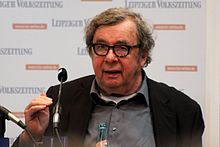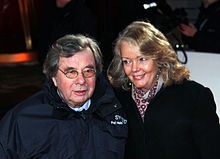Hellmuth Karasek
Hellmuth Karasek (born January 4, 1934 in Brno , Czechoslovakia ; † September 29, 2015 in Hamburg ) was a German journalist , book author , film and literary critic and professor of theater studies . He also wrote three plays under the pseudonym Daniel Doppler . He became known to a wide audience as a participant in the ZDF television program The Literary Quartet .
Life
The Karasek family fled the Red Army from the Silesian Bielitz to central Germany in 1944 during the Second World War and reached Bernburg (Saale) via intermediate stops . Karasek had previously been a member of the Hitler Youth and a student at a National Political Education Institute (Napola) for a few months . His parents were sympathizers of the Nazi regime; later he said: "I had nothing to do with ideology, but I was so unsportsmanlike and a mommy boy that I was mercilessly dragged in the Napola."
During his time from 1948 to 1952 at the Oberschule in Bernburg (today again High School Carolinum ) he set a literary memorial in his book On the Escape as a contemporary document. In it he describes in particular experiences typical of the time in the politically difficult time of Stalinism with his teachers Martin ("Mope") Kersten, Edgar Kampf, Gertrud Mehlhose and Walter Kühlhorn. After graduating from high school in 1952 as the best student, Karasek moved from the GDR to the Federal Republic of Germany . He completed his studies in German , history and English at the University of Tübingen with a doctorate . Karasek told the German Press Agency about his past as follows: “I lived under two dictatorships. I liked the first one and only later realized that it was a pig regime. I hated the second from the start. ”In 1959, Karasek lived for nine months as a young teacher in Ebersberg and taught German at the branch of the Grafingen Goethe Institute. In October he moved to Stuttgart .
Karasek began his journalistic career at the Stuttgarter Zeitung . After that he was chief dramaturge at the Württemberg State Theater in Stuttgart for a year and from 1968 a theater critic for the weekly newspaper Die Zeit . From 1974 to 1996 he headed the cultural department of the news magazine Der Spiegel , where he also introduced the names of authors. After his break with the mirror due to a failure to reprint his criticism of the film Rossini , he processed his experience in a key novel in Das Magazin in 1998 . After working for Spiegel , he was co-editor of the Berlin daily Der Tagesspiegel until 2004 . Karasek then worked for the newspapers Die Welt , Welt am Sonntag and Berliner Morgenpost of Axel Springer SE, among others .
Karasek has also appeared frequently on various television shows. He was a regular participant of over the long period from 1988 to 2001 ZDF telecast The Literary Quartet , under the dominant leadership of Marcel Reich-Ranicki was.
Karasek also worked on issues of the RTL show Die 5-Mio.-SKL-Show as a prominent sponsor of the candidates. Karasek himself said of his television work, which was often criticized, that he could not see anything dishonorable in his television appearances and that television had shaped him the most; he also stated that "a good punch line is better than a bad world". In 2004, the Frankfurter Allgemeine Zeitung called him a “journalistically iridescent turbo carp in the pond of gray pikes”.
In 1992 Karasek became honorary professor at the Theater Studies Institute at the University of Hamburg . He was also a supporter of the Center against Evictions .
In August 2015 he published a commercial for the Ikea catalog on YouTube in the form of an ironic book review.
Private life
He was married to Armgard Seegers for the second time and had four children, including the theater director and artistic director Daniel Karasek , the journalist and writer Manuel Karasek and the lawyer and writer Laura Karasek . His first wife, the Venezuelan music student Marvela Ines Mejia-Perez, had married Karasek in 1959 in Ebersberg. His younger brother was the writer Horst Karasek .
Karasek last lived in Hamburg-Harvestehude . At the age of 81, Karasek succumbed to biliary tract cancer . He was buried in the Ohlsdorf cemetery in Hamburg.
Memberships
Publications
Books
- The so-called "decorative" epithet. Contributions to a New High German poetics . Dissertation , Tübingen 1958.
- Carl Sternheim . Friedrich (playwright of Welttheater 4), Velber near Hanover 1965, paperback edition by dtv, Munich 1982, ISBN 3-423-06804-3 .
- Max Frisch . Friedrich (playwright of the Welttheater 17), Velber near Hanover 1966, paperback edition by dtv, Munich 1984, ISBN 3-423-06817-5 .
- Germany your poets. The nation's pens . Hoffmann and Campe, Hamburg 1970, ISBN 3-455-03705-4 .
- Bertolt Brecht . The latest case of a theatrical classic . Kindler, Munich 1978, new edition 1982, ISBN 3-463-00710-X .
- Karasek's cultural criticism. Literature, film, theater . Rasch and Röhring, Hamburg 1988, new edition 1991, ISBN 3-89136-184-X .
- Billy Wilder . A close up . Hoffmann and Campe, Hamburg 1992, updated and expanded new edition ibid. 2006, ISBN 3-455-09553-4 .
- My cinema. The 100 most beautiful films . Hoffmann and Campe, Hamburg 1994, ISBN 3-455-08564-4 .
- Go West! A biography of the fifties . Hoffmann and Campe, Hamburg 1996, ISBN 3-455-08563-6 .
- Hand in cell phone . Hoffmann and Campe, Hamburg 1997, ISBN 3-455-11221-8 .
- The magazine . Novel. Rowohlt, Reinbek bei Hamburg 1998, ISBN 3-498-03498-7 .
- With cannons on sparrows. Stories at the beginning of the week . Kiepenheuer and Witsch (KiWi 568), Cologne 2000, ISBN 3-462-02904-5 .
- Fraud . Novel. Ullstein, Berlin 2001, ISBN 3-89834-025-2 .
- Collisions. Encounters with contemporaries . Ullstein, Berlin 2002, paperback edition ibid. 2004, ISBN 3-548-36494-2 .
- Freud's Couch & Hempels Sofa. The book of comparisons . Kiepenheuer and Witsch (KiWi 850), Cologne 2004, ISBN 3-462-03433-2 .
- On the run. Memories . Ullstein, Berlin 2004; Paperback edition, ibid. 2006, ISBN 3-548-36817-4 .
- Sweet Bird Youth or The Evening casts longer shadows . Hoffmann and Campe, Hamburg 2006, ISBN 3-455-40016-7 .
- From kissing toads and other incidents . Hoffmann and Campe, Hamburg 2008, ISBN 978-3-455-40107-3 .
- Your thousandfold woes and alas. What men want from women . Hoffmann and Campe, Hamburg 2009, ISBN 978-3-455-40193-6 .
- There are no red lights in paradise . Hoffmann and Campe, Hamburg 2011, ISBN 978-3-455-50205-3 .
- Is that supposed to be a joke? Humor is when you laugh anyway . Quadriga, Berlin 2011, ISBN 978-3-86995-015-0 . (With a foreword by Eckart von Hirschhausen )
- To travel. How I chose Germany for myself . Hoffmann and Campe, Hamburg 2013, ISBN 978-3-455-50286-2 .
- Women are only men too . Hoffmann and Campe, Hamburg 2013, ISBN 978-3-455-50287-9 .
- I don't think that's funny at all! Story in jokes and stories about jokes. Quadriga, Cologne 2015. ISBN 978-3-86995-075-4 .
Audio books
- Hellmuth Karasek reads "Hand in Handy" . Abridged audio version. Audio cassette . Hoffmann and Campe, Hamburg 1999, ISBN 3-455-30180-0 .
- Fraud . Read by Matthias Fuchs . Abridged audio version. Ullstein, Munich 2001, ISBN 3-550-09042-0 (4 audio CDs ) / ISBN 3-550-09542-2 (4 audio cassettes).
- Loriot and Gregor von Rezzori . Two conversations with Hellmuth Karasek . Audio CD. Audiobook, Freiburg im Breisgau 2006, ISBN 3-89964-164-7 .
- Billy Wilder - one life (with Andreas Fröhlich and Felix von Manteuffel, among others ). Audio CD. Argon, Berlin 2007, ISBN 978-3-86610-251-4 .
- Sweet Bird Youth or The Evening casts longer shadows . 2 audio CDs. Hoffmann and Campe, Hamburg 2007, ISBN 978-3-455-30523-4 .
- From kissing toads and other incidents . Audio CD. Hoffmann and Campe, Hamburg 2008, ISBN 978-3-455-30587-6 .
- Is this a joke? If a literary critic comes to the doctor ...; two humor experts share their favorite jokes and ulterior motives. Live from the Every Vernunft bar in Berlin . Eckart von Hirschhausen with Hellmuth Karasek, Hörverlag, Munich 2011, ISBN 978-3-86717-864-8 (1 audio CD, 66 minutes).
- Traveling: How I chose Germany for myself . Hoffmann and Campe, Hamburg 2013, ISBN 978-3-455-30762-7 (audio CD).
editor
- Letters move the world (7 volumes). teNeues, Kempten 2010 ff., ISBN 978-3-8327-9415-6 ( table of contents volume 1 ).
translator
- Raymond Chandler : The Dead in the Lake , Diogenes Verlag 1980
Awards
- Theodor Wolff Prize (1974)
- Bavarian TV Prize (1991)
- Federal Cross of Merit (October 5, 1994)
- Elbe Swan Order (2012)
Web links
- Literature by and about Hellmuth Karasek in the catalog of the German National Library
- Works by and about Hellmuth Karasek in the German Digital Library
- Hellmuth Karasek in theInternet Movie Database(English)
- Publisher information on the author and work at Hoffmann and Campe
Individual evidence
- ^ Treasure of quotations and second violin. ( Memento from October 1, 2015 in the Internet Archive ) Obituary in tagesschau.de from September 30, 2015
- ↑ On the run. Memories . Ullstein, Berlin, paperback edition 2006, ISBN 3-548-36817-4 , pp. 176-189 and 200-225.
- ↑ Hellmuth Karasek celebrates 80th birthday. In: Deutsche Welle . January 3, 2014.
- ^ A b Süddeutsche Zeitung Ebersberg: Goethe am Klostersee , October 9, 2015 , accessed on October 11, 2015.
- ^ Peter von Becker : Germany's first pop journalist. In: Der Tagesspiegel . 4th January 2014.
- ↑ Hellmuth Karasek is dead. In: Frankfurter Allgemeine Zeitung . September 30, 2015.
- ↑ An eloquent chatterer. In: Süddeutsche Zeitung . September 30, 2015.
- ↑ People by our side. In: Center against Expulsions , accessed on May 5, 2017.
- ↑ David Hugendick: The great enthusiast. In: The time . September 30, 2015.
- ^ Mourning: literary critic Hellmuth Karasek died in Hamburg. In: Abendblatt.de. Hamburger Abendblatt, September 30, 2015. Retrieved June 26, 2017.
- ^ Literary critic Hellmuth Karasek is dead. In: Focus . September 30, 2015.
- ↑ Office of the Federal President
| personal data | |
|---|---|
| SURNAME | Karasek, Hellmuth |
| ALTERNATIVE NAMES | Doppler, Daniel (pseudonym) |
| BRIEF DESCRIPTION | German journalist, book author, film and literary critic and professor of theater studies |
| DATE OF BIRTH | January 4, 1934 |
| PLACE OF BIRTH | Brno , Moravia , Czechoslovakia |
| DATE OF DEATH | 29th September 2015 |
| Place of death | Hamburg |



